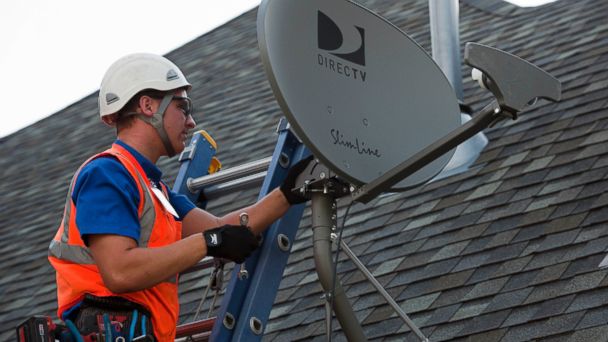Consumer Uproar Over AT&T Bid for DirecTV
Morning Money Memo…
Consumer groups are in full cry against the proposed takeover of satellite TV company DirecTV by AT&T.
"That's not good for consumers," says Craig Aaron, president of the non-profit media and technology advocacy group, Free Press. "Their prices end up going up when there is less choice, less competition."
AT&T has agreed to buy satellite TV provider DirecTV for $48.5 billion, or $95 per share. The proposed combination could improve AT&T's Internet service by pushing its TV subscribers into video-over-satellite service.

Paul Taggart/Bloomberg via Getty Images
That would free up bandwidth on AT&T's telecommunications network. It would also give AT&T a larger base of video subscribers and improve the company's ability to compete against Comcast and Time Warner Cable, which agreed to a merger in February.
AT&T's chief executive Randall Stephenson says the combined company will be able to "deliver content to consumers across multiple screens - mobile devices, TVs, laptops, cars and even airplanes."
But the deal is expected to face tough scrutiny from federal regulators.
"The Federal Communications Commission, the Department of Justice will be reviewing this merger," says Harold Feld of Public Knowledge, a non-profit internet information organization. "This will be reviewed at the same time that they also have the Comcast/Time Warner Cable and charter deals in front of it."
AT&T's U-verse competes directly for TV customers with DirecTV, and analysts say the combination would reduce the number of possible pay TV providers from four to three for about 25 percent of U.S. households. That could result in higher prices for consumers.
But the rise of Amazon, Netflix, Hulu and other streaming TV services has led to increased competition. Pay-TV firms know many consumers find it easier to cut the cable because technology is offering them other choices.
Speaking of mergers, the board of the British drug maker AstraZeneca is rejecting the new improved takeover offer from Pfizer. AstraZeneca says it's confident about its prospects as "an independent, science led business."
Pfizer, the world's second-biggest drug maker by revenue, offered to pay $119 billion for its British rival, saying their businesses are complementary and would be stronger together.
AstraZeneca's board said it believes Pfizer is making "an opportunistic attempt to acquire a transformed AstraZeneca, without reflecting the value of its exciting pipeline."
Want some relief from inflation? The average price of a gallon of regular gasoline is likely to show another drop when the U.S. Energy Department issues its weekly survey later today.
"The national average price of gas likely is at or very near its peak for this spring," says a AAA statement. Most oil industry analysts expect summer gas prices to be lower than last year.
The U.S. government is stepping up efforts to help Central American farmers fight a devastating coffee disease - and hold down prices.
A fungus called coffee rust has caused more than $1 billion in damage across Latin American. The fungus is especially deadly to Arabica coffee - that's the bean that makes up most high-end, specialty coffees.
It's already led to higher prices for many coffee drinkers. The U.S. Agency for International Development says it's concerned about the economic security of small coffee farms abroad.
Richard Davies Business Correspondent ABC News Radio abcnews.com Twitter: daviesnow